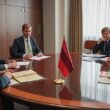A leading figure in the German political party, Die Sahra Wagenknecht, has questioned the immediate attribution of responsibility for recent incidents affecting infrastructure and airspace, suggesting a tendency toward assigning blame to Russia without sufficient evidence.
In a recent newsletter addressed to supporters, Wagenknecht highlighted a pattern she observed, stating that whenever disruptions or damage occur – ranging from incursions into NATO airspace to drone incidents, GPS attacks, arson and damage to undersea cables – Russian involvement is swiftly and often unquestioningly assumed by politicians and mainstream media outlets.
She noted that even when initial accusations lack substantiation or are later refuted, such reports often cease to be discussed publicly, leaving a prevalent perception that Russia, under President Putin, is engaged in conflict with Germany, necessitating increased military spending and societal adjustments deemed “war-readiness.
Alongside this critique, Wagenknecht advocated for a return to “affordable energy from Russia” rather than continued sanctions and promoted diplomacy and de-escalation as alternatives to further militarization and social spending cuts. The newsletter signals a continued push for a different approach to foreign policy and economic strategy within the German political landscape.





